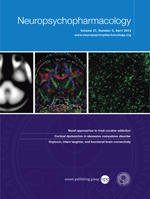导读:困乏的人需要借助一杯咖啡这样的柔和兴奋剂来提升工作状态,但这对有些人来说却可能产生相反效果。加拿大研究人员在一项老鼠实验中发现,有些原本就很“进取”的老鼠在被注射刺激类药物后反而懈怠了。

加拿大不列颠哥伦比亚大学研究人员28日在美国《神经精神药理学》杂志上发表报告称,他们以实验鼠为对象进行了一项刺激类药物测试。在实验中,老鼠可以选择“容易任务”或“困难任务”,选择“困难任务”并且成功通过的老鼠会得到加倍的奖励。研究人员发现,有一些老鼠选择“困难任务”的次数明显多于他们的“懒惰”同伴,研究人员将它们定义为“自我驱动强烈”的老鼠。
之后,研究人员给这两类老鼠都注射刺激类药物安非他明和咖啡因,结果发现,那些“自我驱动强烈”的老鼠明显松懈了下来,而原本“懒惰”的老鼠在被注射了安非他明后,表现得更勤奋了。
“从彻夜开车的卡车司机到为应对考试而熬夜复习的学生,每天都有数百万人使用含咖啡因饮料帮助自己清醒和警觉,并且提高工作效率”,此项研究的负责人杰·霍斯金说,“研究成果表明,一些兴奋剂或许会对本来就喜欢面对挑战的人带来消极影响。”

Sensitivity to Cognitive Effort Mediates Psychostimulant Effects on a Novel Rodent Cost/Benefit Decision-Making Task
Paul J Cocker Jay G Hosking James Benoit and Catharine A Winstanley
Amotivational states and insufficient recruitment of mental effort have been observed in a variety of clinical populations, including depression, traumatic brain injury, post-traumatic stress disorder, and attention deficit hyperactivity disorder. Previous rodent models of effort-based decision making have utilized physical costs whereas human studies of effort are primarily cognitive in nature, and it is unclear whether the two types of effortful decision making are underpinned by the same neurobiological processes. We therefore designed a novel rat cognitive effort task (rCET) based on the 5-choice serial reaction time task, a well-validated measure of attention and impulsivity. Within each trial of the rCET, rats are given the choice between an easy or hard visuospatial discrimination, and successful hard trials are rewarded with double the number of sugar pellets. Similar to previous human studies, stable individual variation in choice behavior was observed, with ‘workers’ choosing hard trials significantly more than their ‘slacker’ counterparts. Whereas workers ‘slacked off’ in response to administration of amphetamine and caffeine, slackers ‘worked harder’ under amphetamine, but not caffeine. Conversely, these stimulants increased motor impulsivity in all animals. Ethanol did not affect animals' choice but invigorated behavior. In sum, we have shown for the first time that rats are differentially sensitive to cognitive effort when making decisions, independent of other processes such as impulsivity, and these baseline differences can influence the cognitive response to psychostimulants. Such findings could inform our understanding of impairments in effort-based decision making and contribute to treatment development.
文献链接:https://www.nature.com/npp/journal/vaop/ncurrent/abs/npp201230a.html








